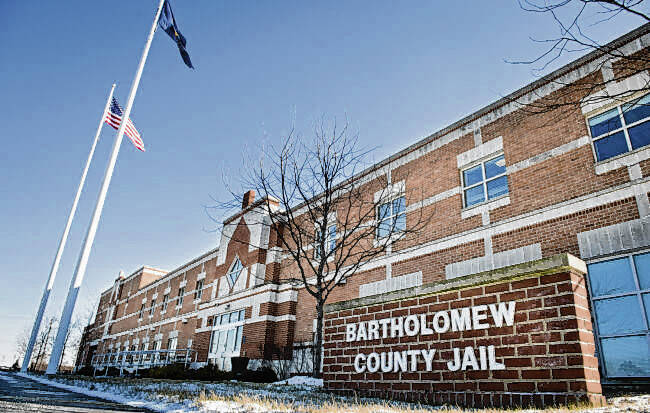
Mike Wolanin | The Republic The exterior of the Bartholomew County Jail in Columbus, Ind., pictured Friday, Dec. 15, 2017.
The Bartholomew County Sheriff’s Department paid more than 15,000 hours in overtime wages last year as the department struggled to contend with staffing shortages and keeping enough deputies on the road while trying at the same time to maintain a jail staff.
The department, which averaged roughly 41 hours in overtime wages per day in 2022, paid out just over $513,193 in overtime over the course of the year, resulting in some patrol deputies making more money than their supervisors — including one deputy who was paid over $44,000 in overtime wages and nearly made more money than the sheriff.
The amount of overtime that the sheriff’s department incurred last year was largely driven by staffing shortages and prevented the department from filling a position with the joint intelligence-led policing initiative, maintaining as much security as officials would like at the Bartholomew County Courthouse and hiring a narcotics officer as overdose deaths soared to their highest levels on record, said Bartholomew County Sheriff Chris Lane.
The department did not use any additional appropriations to pay for the overtime, according to Lane, who said money from unfilled positions was used to pay the overtime for those who were working.
The sheriff’s department is required by law to keep a certain number of deputies on the roads each shift, and “it takes so many people to run the jail,” Lane said. But with so many vacancies, the department had to resort to shuffling people around and having existing staff work overtime to meet the headcount requirements.
At one point last year, the sheriff’s department had six openings for patrol deputies, Lane said. Until recently, the department also had about 15 openings for corrections officers who work inside the jail.
“When you’re down that amount of people, we have to make that minimum number, and we’re a 24/7, 365-day-a-year business,” Lane said. “…You’ve got to have the staff out there, and so the way you do it is by overtime.”
Even though the sheriff’s department hired several deputies last year, new hires aren’t able to start patrolling immediately. Generally, new hires have to attend the law enforcement academy for about 16 weeks and then do field training for about three to four months, Lane said.
Three deputies who started the academy this past May didn’t finish their field training until December, Lane said. Another two deputies hired early last year had already gone through the academy but still needed to undergo field training.
‘Burnout factor’
The reliance on overtime also has raised concerns at the department about burnout and fatigue among deputies and corrections officers, including some who have had to work upwards of 84 hours in a week without a day off.
In many cases, the only way that deputies could get a day off last year was by calling in sick, according to the sheriff staff.
Lane recalled what he described as a “burnout factor,” including instances in which corrections staff have “come in and said, ‘I’m tired of working 70 hours a week. I can’t do it no more.’”
“When you get to so much overtime, and guys are working 12-hour shifts, and they’re working five, six, seven, eight or more shifts in a row where they don’t have that day off, their work-life balance, it doesn’t exist,” Lane said. “And I think that can create a lot of other health issues.”
“We are in a line of work that split seconds matter,” Lane said of the potentially dangerous work environment that deputies and corrections officers work in every day. “Split-second decisions are important. People can get seriously hurt if somebody’s tired, and that officer can be hurt, or somebody else could be hurt because of that.”
Withholding the figures
Bartholomew County Auditor Pia O’Connor denied a request from The Republic to obtain information about overtime wages paid to sheriff’s department employees.
O’Connor denied a request from The Republic to provide the amount of overtime each sheriff’s department employee was paid and how many overtime hours they worked. O’Connor said in an email that it was too difficult for her department to access the information in its accounting system.
She further stated that “we don’t believe this is necessary to provide,” referring to overtime paid to county employees.
Following the denial, The Republic filed another request asking for the just overtime wages of six deputies whose total 2022 compensation ranged between roughly $78,000 and $121,000 for the year.
O’Connor denied the second request, stating: “I’m not going to provide that information.”
Currently, it is unclear what the legal basis is for O’Connor’s denial, as she did not provide one in response to the request. The auditor’s office keeps the county’s financial records regarding payments to employees and disbursements of county money, which are public records, according to Indiana’s Open Records law.
The Republic then reached out to Lane, who immediately agreed to provide the information and to talk about staffing issues in 2022 that led to the overtime payments.
The Republic has filed a formal complaint about O’Connor’s denial with the Indiana Public Access Counselor, who will decide whether her refusal to provide the information about overtime wages of county employees was a violation of Indiana’s public records law.
Indiana Public Access Counselor Luke Britt told The Republic that “you should be able to get all that info by citing a specific employee.” The Republic provided the names of some of the highest paid deputies to O’Connor seeking the information, which she denied.
The Republic has provided Britt with the requests for the information and copies of the denials from O’Connor.
‘A constant cycle’
Lane said he plans to meet with the Bartholomew County Council this month to make the case for two additional deputy positions to allow the department to stay ahead of the months-long training cycle and not be “forced to put out so much overtime.”
Lane said he requested the two deputy positions from the county council last year, but “it didn’t get any traction.” The council refused to fund the positions included in Lane’s budget request for 2023.
Currently, Lane said the sheriff’s department is still “down staff substantially in the jail” and but is now fully staffed with deputies.
However, Lane expects that there will be two openings for deputies within the next month, likely resulting in overtime again for the remaining deputies. And even if those two positions are filled immediately, the new hires wouldn’t be able to go to the law enforcement academy until May and wouldn’t finish field training until early 2024.
“We get down on staff, and then they are working so much overtime, you never are able to dig your way out of a hole,” Lane said. “We’re always there because we get people hired, and then the others are so tired (that) they quit and then you’re right back down in the same place.”
“It’s just a constant cycle,” Lane added. “We’ve got to break that cycle. We’ve got to make some adjustments. We need some more staff added to the rotation to be able to stay ahead of the curve, instead of being behind.”




